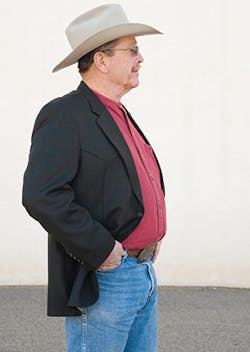It’s sunrise in Sundown, TX. David Campbell’s day has begun and will not end until it truly is sundown. Campbell, part owner and manager of Campbell Airvac Systems, oversees a dozen employees who work the oil fields of the Permian Basin, a sedimentary basin that runs south of Lubbock, TX to south of Midland and Odessa and west to southeastern New Mexico. It contains one of the world’s thickest deposits of rocks from the Permian geologic period and is home to the Mid-Continent Oil Producing Area, an immense oil and natural gas producing area. It is here that Campbell’s company runs a fleet of Vacmaster air vacuum systems to locate lines, dig, and fill in the holes for many of the major oil companies, such as Oxy and Apache Corp. Campbell splits his time between the field and the office, making sure the trucks are in good working order and are out at the right jobs and also in the office, where he works on the books. Oil field work is booming in Texas; so is excavation as a support service. “It’s not even started to grow. Services like ours are going to explode, because this is the only way that you can really safely locate lines,” says Campbell. To keep up with the demand for his services, Campbell bought out Tashe Excavation. “We had more trucks than they did and they had more Master Service Agreements (MSA) than we had,” says Campbell. “Buying this company, we picked up a couple of bigger Vacmaster System 6000s and 40 more major companies with MSAs.”
What Led Him to This Field
Excavating dirt with vacuum hoses was not something Campbell had wanted to do all of his life—rather, he spent his life as a cowboy. “I just happened to be in the right place at the right time,” he notes of the oil field excavation work. “You start going down one road one day and then you’re turning around, going a different way.” He still likes to wear his cowboy hat, even on the job. “Those dang pick-ups with those head rests make it kind of hard to wear one all of the time,” he adds.
What He Likes Best About His Work
Campbell is enjoying the opportunities afforded to him running an excavation operation in the oil fields of Texas. He likes the easy-going nature of the people he meets on the job. “The oilfield work in Texas is buzzing,” he says. “It’s exciting and it’s changing constantly, moving everywhere.”
His Greatest Challenge
Campbell has a challenge that many would envy: His line of work has generated so many opportunities that he’s come to that fork in the road where he’s got to decide whether or not to further expand his fleet and labor pool. He wants to ensure that however he chooses to respond, his company can handle it by having good equipment operators. For Campbell, the best jobs also are the ones that run the smoothest. To ensure that, he’s constantly talking safety to his crews and checking the trucks for issues that can cause a breakdown as down time is lost revenue. Safety is a primary reason why he chooses to use air vacuuming rather than backhoes. He’d rather take more time doing the work with an air vacuum than putting out money to repair a line that’s been hit with a backhoe. He also prefers air-vacuuming because it addresses an ongoing challenge in Texas: drought, a driving factor behind a ramped-up effort at water conservation in the state. There’s also the convenience: he can immediately drop the dirt he’s dug up back into the hole and he doesn’t have to deal with the slurry created by vacuuming that utilizes water pressure. That slurry mix hardens and may contain chemicals such as benzene, creating another concern with the lands on which it’s poured when it becomes hard as mortar, making it difficult to remove. His Vacmaster units are equipped with the capacity to use water as needed, such as when the crews need to get through hard pan. Campbell says that for the most part, however, the future of vacuum excavation is in air.
